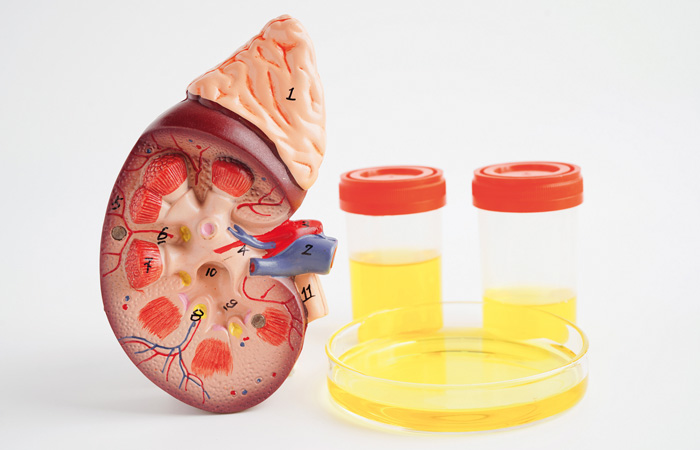Common causes of excessive thirst and urination
Likely diagnoses
- Medicines
Recent initiation of diuretics for volume overload are an obvious cause, but other medicines – notably long-term lithium – can cause polyuria and polydipsia (in up to 70 per cent of patients) or if an overdose occurs, causing acute toxicity. Excessive alcohol and caffeine can also cause this effect.
- Diabetes mellitus
Diabetes should be suspected, particularly if the patient has an associated history of weight loss (type 1 diabetes) or is an obese adult with a family history of type 2 diabetes. Other symptoms, besides the ‘4Ps’ (i.e. polyuria, polydipsia, polyphagia and polyneuropathy) that may be observed are fatigue, dry skin and frequent infections.
Possible diagnoses
- Chronic renal failure
Moderate to severe chronic kidney disease can occasionally give rise to either polyuria or nocturia (the need to get up at night regularly to urinate). Other signs and symptoms will be present, such as nausea, vomiting, loss of appetite, fatigue, ankle swelling and shortness of breath.
- Diabetes insipidus
Diabetes insipidus is a metabolic disorder, of which two types exist: central diabetes insipidus, which is caused by reduced synthesis or release of arginine vasopressin (AVP) [also called antidiuretic hormone or ADH] and nephrogenic diabetes insipidus, caused by renal insensitivity to AVP. Both are characterised by generation of large amounts of dilute urine and feeling thirsty all the time. Other symptoms: muscle weakness, constipation and dry skin.
- Hypokalaemia
Mild hypokalaemia (3-3.5mmol/L) rarely causes symptoms but may be detected as part of routine health screening and in the clinical investigation of many diseases.
The condition is generally measured in those who take diuretics, and during investigations of high blood pressure and kidney disease. Clinical features occur in moderate to severe hypokalaemia or if it is persistent. These include muscle weakness, renal abnormalities, ECG changes and polyuria.
- Hypercalcaemia
Hypercalcaemia is a well-known but overlooked cause of polyuria. It causes dehydration by inducing renal resistance to vasopressin, leading to nephrogenic diabetes insipidus.
As well as polyuria/polydipsia, a history may also reveal a patient with lethargy, fatigue, confusion, depression, irritability and constipation.
Chronic symptoms are more consistent with hyperparathyroidism, whereas more recent onset of symptoms suggests malignancy. Hypercalcaemia can also occur in sarcoidosis.
- Hyperthyroidism
The signs and symptoms of hyperthyroidism are varied and often non-specific. Common and obvious symptoms include anxiousness, loss of weight despite a good appetite, diarrhoea, breathlessness, feeling hot and palpitations. Thirst and polyuria can also be experienced but are less common.
- Hyperparathyroidism
Primary hyperparathyroidism (PHPT) is an endocrine disorder in which overproduction of parathyroid hormone (PTH) results in derangement of calcium metabolism.
A diagnosis is confirmed through elevation of serum calcium and inappropriate elevation of PTH. Clinical features associated with primary hyperparathyroidism include thirst, increased urine output, constipation, fatigue and memory impairment.
Longer term effects include kidney stones, osteoporosis and cardiovascular disease. Women are twice as likely to be affected as men, with a peak incidence between 50 and 60 years of age.
- Primary polydipsia
Primary polydipsia is a condition where there is excess consumption of fluids leading to polyuria with diluted urine. It is classified into two types: psychogenic polydipsia and dipsogenic polydipsia.
Psychogenic polydipsia is seen in patients with several psychiatric conditions, such as depression, bipolar disorder, and more commonly in schizophrenic patients.
Dipsogenic polydipsia is seen mostly in people who consciously drink large quantities of water to maintain a healthy lifestyle. Prevalence is increasing in the general population with the advent of healthy lifestyle programmes.

